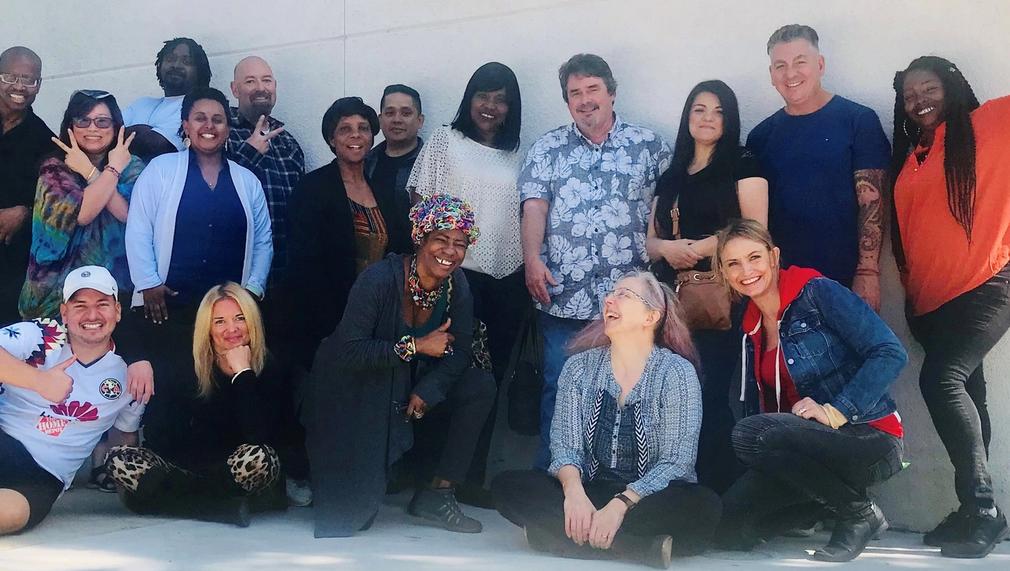Thriving Through Housing and Social Support
Through our innovative Collaborative Housing program, which connects people to evidence-based housing practices and social support, we will transform the lives of 15 formerly homeless individuals, into taxpayers by providing them an affordable place to live and support to thrive and realize their goals. Our Peer Bridgers (mentors who are formerly homeless and/or in recovery) connect residents to social support (self-help support groups) giving residents a sense of meaning and purpose as well as a social network to accelerate their life goals.

What is the primary issue area that your application will impact?
Affordable housing and homelessness
In what stage of innovation is this project, program, or initiative?
Expand existing project, program, or initiative (expanding and continuing ongoing, successful work)
What is your understanding of the issue that you are seeking to address?
The 2023 LA Homeless Count found that 75,518 people were homeless in LA County. SHARE! Collaborative Housing is an evidence-based program that houses adults with serious mental health issues immediately – 41% within the first 24 hours. The avg. cost of housing one person in LA County is $500,000+. We house people at a fraction of the cost of traditional models and have better outcomes. Only 4% of our residents become homeless again within four yrs., compared to 22% of those in traditional models. People have to have a sense of meaning & purpose to experience a sense of dignity. They need a vibrant social network to support their life goals. We move people into housing immediately. Because our Peer Bridgers are peers, they connect with residents in a way that builds trust & removes shame. We support residents in the work of changing behavior. The system doesn’t provide these things. Our program does. These are key elements in order to maintain housing and not go back to the streets.
Describe the project, program, or initiative this grant will support to address the issue.
What separates SHARE! from other housing programs is we use existing resources, i.e. single-family houses for rent and Peer Bridgers for Support Services. Peer Bridgers are people who are formerly homeless and/or in recovery who’ve turned their lives around through self-help support groups. Residents live like college roommates, create rules for each house and pay rent to the landlords using benefits, other subsidies, or income from jobs, if they have one. Once housed, each resident works with a Peer Bridger on a Plan for Success, is connected with self-help support groups, health, mental health, educational, vocational, and other benefits and services they qualify for. Peer Bridgers create a culture of recovery in each house. They visit residents regularly and are available to address problems/concerns. 40% of whether people thrive is directly related to the amount and quality of social support in their lives. By connecting residents to self-help support groups, they find community and see others engaged in living a full life. Meetings give them meaning and purpose. They take this back to our houses and work with the Peer Bridgers on making their dreams come true. Our program is effective at helping residents rebuild their lives. Within 12-18 months, 58% of residents secure market-rate housing and 24% get reunited with their families, as they are self-supporting. 26% of homeless people with severe mental health issues gain employment within their first year with us.
Describe how Los Angeles County will be different if your work is successful.
Our work is successful when we meet our goal of transforming the lives of 15 homeless individuals. They will maintain housing, increase income, gain employment & have a higher quality of life. Funding from LA2050 will enable us to make a dent in our overall goal of helping to end homelessness in LA County. There are many housing programs in LA that use traditional models. Our program is so unique that we often do not fit the boxes & must find other funding sources. We also get referrals from 200 agencies because they can’t house everyone & know our program works though we don’t receive funding from them. We seek to shine a spotlight on peer-run housing that provides peer services, as part of the solution to end homelessness which will lead to system transformation. Our Collaborative Housing program is scalable. We housed 574 people from 07/23 to 06/24 & aim to house 5,000 a year in five years. We are also looking to replicate our housing program in other areas outside LA County.
What evidence do you have that this project, program, or initiative is or will be successful, and how will you define and measure success?
We housed over 2,200 people since 2019 & have produced outstanding results: 25% of disabled people who move into our houses are still there 5 years later, mostly seniors, many of whom make us their permanent home; 20% of residents are enrolled in higher ed.; 57% of residents of employment age have jobs at any one time. We house anyone who needs housing without any questions or background checks. Our priority: getting people housed. Our key to success is encouraging 70-80% of residents to attend self-help support groups where they leave problematic behaviors behind, learn to problem-solve, make new friends, address mental health and substance issues, & grow their social networks. Studies confirmed that 40% of good mental health is a result of social support. We track demographic data, move-ins/outs, employed residents, attending school, receiving health, mental health, or other services, the # of residents attending self-help support groups, & where they moved to after leaving us.
Approximately how many people will be impacted by this project, program, or initiative?
Direct Impact: 15.0
Indirect Impact: 200.0